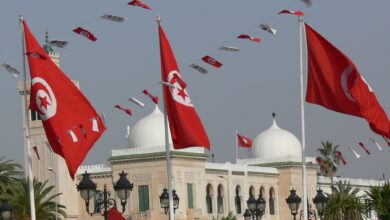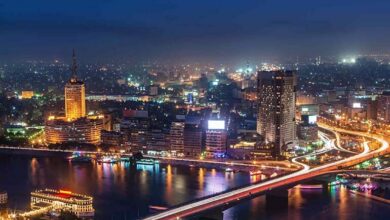The 25 January protests which hit Egypt yesterday may prove to be a historic turning point for Egypt’s small and feckless opposition. The “Day of Anger” saw tens of thousands take to the streets in most major Egyptian cities, with many demonstrations continuing well into the night. The turnout was exceptionally high, by Egyptian standards, and unprecedented in Mubarak’s 31-year reign. The recent uprising in Tunisia has inspired a new confidence in many Egyptians that public dissent is effective and their voices need to be heard.
In Cairo, protesters congregated at different points and snaked through various parts of the city, gathering more supporters and effectively evading any security cordons, before finally pouring into Downtown’s Tahrir square, where they grew into an estimated crowd of 15,000. The rally, which was the largest in the country, drew everyone from high-profile opposition figures and activists, to film stars and famed novelists, to working people from the neighborhood, to whole families with their children.
But more than any other group, it was the throngs of spirited and enthusiastic youth that dominated the gathering. This was their protest. Internet-savvy, largely middle class, and enraged at a regime that gives them much to worry about and little to aspire for, this large segment of Egypt’s young population came out to cry for change. And so they did with a sudden upsurge that surpassed many people’s expectations.
Contrary to portrayals by Western media outlets and many local analysts of Arab political opposition being dominated by an Islamist discourse bent on violence and oppression, most of the protesters were remarkably peaceful and their demands nonsectarian. In Tahrir, hardly an Islamist slogan was heard, no displays of religious symbols were apparent and the only leaflets distributed were those bearing the demands of the protesters for the formation of a new government. Just after midnight, as security men forcefully dispersed the protesters from the city’s main square, one unified chant could be heard echoing through the streets: “The people want the regime ousted.”
The regime’s response has been stubborn but crafty. What started off as relative lenience on the part of security forces ended with a midnight shower of rubber bullets and tear-gas canisters on demonstrators in Tahrir that left dozens injured and many more detained. Meanwhile, Egyptian security imposed a blockade on communication about the protest, shutting down Twitter and UStream, as well as Egypt’s three mobile networks over the Downtown area. Online opposition paper Al-Dostour had its website blocked recurrently throughout the day. Today, state-owned newspapers completely downplayed both the size and significance of the event, as if nothing out of the ordinary had taken place.
Perhaps this blackout is being implemented in hopes that the protesters and their grievances will soon disappear. Or, perhaps it reveals just how disconnected the regime is from political realities on the ground that threaten to push this country to the brink of an implosion. As people across the region–in Yemen, Algeria and Tunisia–raise voices of dissent against their governments, the Egyptian regime should be worried about what the future holds in store.
So what next? Will Egypt’s burgeoning youth protests escalate? Will they grow into an organized movement? And, if so, will it be able to incorporate other social groups or at least build strong bridges with other protesters, especially in the labor sector? Most importantly, will the Mubarak regime concede to any of the demands of Egypt’s youth? There are no clear answers yet, and only time will tell.
What we do know is that the 25 January protest call put Egypt’s official opposition–including Tagammu, Wafd and the Muslim Brotherhood–on the defensive as all these groups wavered between hesitant support and outright refusal to take part in the event. The “Day of Anger” may prove to be the catalyst needed to divide these parties internally and raise the level of politicization among their younger cadres. This would be no small legacy.
The Tunisia fever is spreading rapidly across the Arab world. Many have argued that a Tunisia-style uprising is unlikely to be replicated in Egypt due to fundamental differences in the composition of the regimes and societies of both countries. But Egyptians yesterday demonstrated their political versatility and impressive capacity to defy the restraints imposed upon them by a strong security state. Perhaps the “Tunisia model” does not threaten to bring down the Mubarak regime any time soon. But it does have the potential to transform Egypt’s opposition into a larger, more spontaneous and more inclusive movement that is capable of mounting serious political challenges to the regime in the future.




